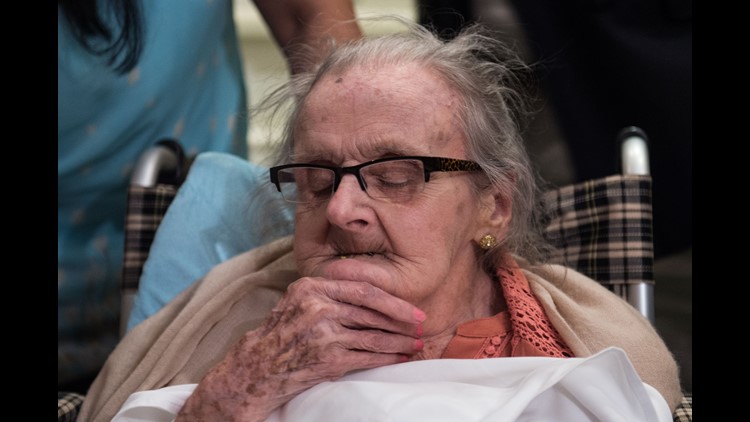HONG KONG — Clare Hollingworth, who was the first to break the news that World War II had started, died Tuesday at the age of 105.
It was on September 1, 1939, as a reporter for London’s Daily Telegraph that Hollingworth awoke to the sounds of war in Katowice, Poland.
According to Telegraph reporting, she quickly rang a secretary and said, “The war has begun.”
“Are you sure, old girl?” the secretary asked.
“Listen!” she said, holding the receiver out the window. “Can’t you hear it?”
The story was by-lined “from our special correspondent in Katowice” and only gained a small spot on the front page. When her driver told her the noise came from an air raid practice, Hollingworth feared she had made a colossal gaffe, but her reporting was accurate.
In the following years, Hollingworth would report on conflict throughout Europe, Africa and Asia.
Illustrious career
Known as the “doyenne of war correspondents,” Hollingworth’s career took her to Palestine, Iraq and Iran, where she was the first to interview 21-year-old shah Mohammed Reza Pahlevi, who was overthrown by revolutionaries in February 1979.
As correspondent for the Economist and the Observer, Hollingworth was in Jerusalem in July 1946 when the King David hotel where she was staying was bombed by Zionist paramilitaries led by future Israeli prime minister Menachim Begin, the only man who’s hand she refused to shake. “I would not shake a hand with so much blood on it,” she told the Guardian in 2004.
From the Middle East, Hollingworth switched to covering the conflict in Vietnam, where she scored a scoop in 1968 that peace talks would shortly begin between Hanoi and Washington.
Another scoop she was ahead of was the defection of British spy Kim Philby, who Hollingworth knew personally. She reported in the Guardian that Philby had fled to Russia, but the story was largely buried by her editors, fearing a libel suit. Philby was later awarded the Order of Lenin and made a KGB general. He died in Moscow in 1988.
Covering China
In 1972, Hollingworth, then 61, became the Telegraph’s first Beijing correspondent since 1949.
“I cannot now recall ever being lonely in China,” she wrote in her memoirs. “After dinner alone I used to go to my room and sit on a hard chair with a straight back and think how lucky I was to be in China!”
She reported from China during the Cultural Revolution — a decade of violence and civil war that caused the deaths of hundreds of thousands — rapprochement with the West, and the death of Mao Zedong.
A home in Hong Kong
After a stint back in the UK as defense correspondent, she traveled to Hong Kong to cover the colony’s handover to Chinese control in 1997.
She would become an institution there, a frequent sight in the city’s Foreign Correspondent’s Club.
In a statement Tuesday, the Foreign Correspondents’ Club praised Hollingworth’s “remarkable career as a foreign correspondent.”
“We are very sad to hear about Clare’s passing,” said Hong Kong club President Tara Joseph. “She was a tremendous inspiration to us all and a treasured member of our club. We were so pleased that we could celebrate her 105th birthday with her this past year.”
Hollingworth died Tuesday in her flat on Glenealy in Hong Kong’s Central district.
Her passing was announced in a statement by her family published on the Celebrate Clare Hollingworth Facebook group.
“Although Clare made her name by getting the scoop on WWII … that event arguably overshadowed some equally impressive achievements,” they said.
“During the war Clare was all over the Balkans, the Middle East and North Africa. She was in Palestine for the final run-up to the foundation of Israel. She covered the civil war in Algeria, and was in India, Pakistan, Bangladesh and Vietnam during their conflicts.”
“Clare pushed the boundaries for women in journalism, and though she has gone, her legacy will certainly live on.”



